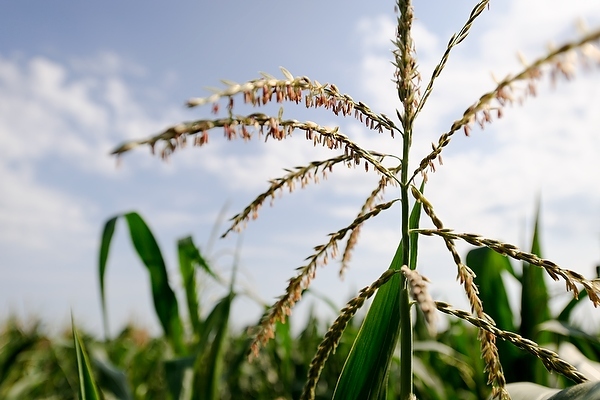Winning teams address global food system challenges, from food spoilage to hunger

Winners in the Agricultural Innovation Prize competition held at UW–Madison this past weekend, tackled the challenges of global food systems.
The national Agricultural Innovation Prize: Powered by 40 Chances announced winning student teams during a two-day competition held at the University of Wisconsin–Madison on April 25-26, where students, competition judges, experts from a range of backgrounds and the public explored finalists’ projects and larger ideas in business, science and society.
Sponsored by the Howard G. Buffett Foundation in cooperation with the United States Department of Agriculture and in partnership with the Wisconsin Institute for Discovery (WID), the prize awarded $240,000 in prizes to undergraduate and graduate students across the country to advance their proposals to improve global food systems.
The first-place team received $100,000 from the foundation – the largest award for an agriculturally focused student competition.
“This project is about inspiring the next generation of food system innovators to believe that they can create the future they dream of and the future we need,” says Molly Jahn, professor of genetics at UW–Madison and Discovery Fellow with WID, who led efforts organizing the Ag Prize. “Every team that traveled to Madison will have a role to play in the future of agriculture. We hope the Ag Prize will create networks of lifelong value for our student innovators and provide necessary resources and inspiration to push them further towards their goals.”
First-place team, Coolify: Coolify serves as a business solution for fruit and vegetable producers in India working in areas where high temperatures and humidity often lead to food spoilage.
Led by Rajat Sethi and Santiago Arias Duval from the Massachusetts Institute of Technology and Ananth Raj Gudipati from Harvard University, the group seeks to empower producers by establishing a network of cooler storage units closer to harvest points to increase profits, reducing food waste and allowing producers to have a more direct role in the distribution process.
Coolify relies on a vacuum insulation panel technology that costs approximately $8,500 per unit, compared to $1.5 million for traditional bulk cold containers currently in use, the group says.
The prize will help the team establish pilot sites at critical locations in Asia to test the approach.
“This project is about inspiring the next generation of food system innovators to believe that they can create the future they dream of and the future we need,”
Molly Jahn
In addition to the grand prize, five other finalist teams received $25,000 from the Howard G. Buffet Foundation:
Middlebury Foods: Middlebury Foods works to provide healthy food options at “fast food” prices. Middlebury College students Nathan Weil and Elias Gilman lead the program, purchasing high-quality meats and vegetables, and bundling them in monthly boxes to sell at delivery sites such as churches and community organizations in Vermont.
Unlike most community supported agriculture (CSA) programs, Middlebury Foods does not follow a subscription or membership model; rather, it supports one-time purchases that cost approximately $1.50 per meal — a price comparable to a fast-food meal.
With the prize, the group will scale the model and investigate expanding it to other areas to address malnutrition and hunger.
Ho’oulu Pacific: Ho’oulu Pacific integrates soilless farming technology and coordinated agricultural practices to distribute fish and vegetables to disadvantaged Pacific Island communities with a high risk of heart disease and diabetes.
David Walfish, Ilima Ho-Lastimosa and Keith Sakuda from the University of Hawaii-West Oahu created the program, coordinating with community partners to offer counseling, nutrition education and entrepreneurial guidance.
The prize will allow Ho’oulu Pacific to continue scaling its project throughout the state of Hawaii and Pacific.
Pasturebird LLC: Pasturebird LLC, a pastured livestock farm in Southern California, focuses on technology that brings chicken production “back outside on grass.”
Paul Grieve from the University of California, Los Angeles, Jeff McDaniel from Concordia University and Rob McDaniel from Western University formed the company, with an emphasis on rotational practices that allow chickens to graze and live in solar-powered and automated enclosed “chicken tractors” outdoors.
The team says waste generated from the process can enrich land rather than deplete it, reduce the amount of feed farmers need to purchase and may even result in decreasing poultry farmers’ reliability on antibiotics to stave off disease.
The prize will help the team prototype the tractors and begin marketing the technology to existing poultry companies.
MIGHTY MEALworm: MIGHTY MEALworm, led by UW–Madison students Rachel Bergmans and Valerie Stull, is a startup focused on producing edible mealworm protein powder to improve food security in parts of sub-Saharan Africa most affected by drought and climate change.
The team chose mealworms because of the insects’ appetite for a variety of foods, ability to survive on little water and their role in recycling nutrients and waste into high quality protein — about 40 percent protein by weight (for reference, chicken is around 30 to 35 percent).
With the prize, the team will focus on micro-financing women’s cooperatives in Africa and introducing the concept to areas where insect consumption is already culturally acceptable.
Love Grain: Love Grain, co-founded by Harvard University students Aleem Ahmed and Caroline Mauldin, seeks to build beneficial relationships between farmers and families that produce teff, a grain grown in Ethiopia.
With the support of the prize, the company will finance seed and fertilizer purchases for Ethiopian producers, and continue teaching new planting practices and purchasing teff directly from farmers. The team plans to further investigate the U.S. market for teff with its gluten-free pancake and waffle products.




